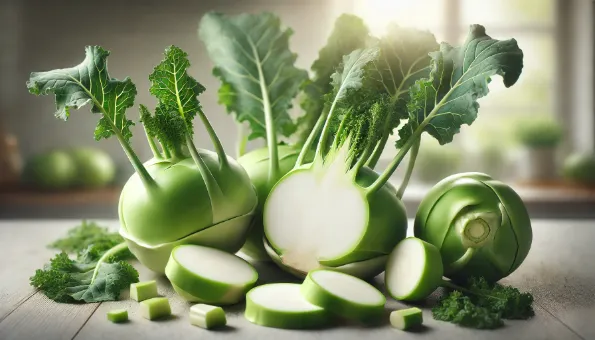Kohlrabi: Crisp, Mildly Sweet Crucifer
Juicy, crunchy bulbs and tender leaves rich in vitamin C and fiber—tasty raw, roasted or stir-fried.

What Is Kohlrabi?
Kohlrabi (*Brassica oleracea* Gongylodes group) is a bulbous stem vegetable from the cabbage family. It tastes like a cross between broccoli stems and radish—**crisp, juicy and mildly sweet**. Both the swollen stem (the “bulb”) and young leaves are edible.
Nutrition Profile
Per 100 g raw: **~27–36 kcal**, **~6–8 g carbs**, **~1.5–2 g protein**, **~3–4 g fiber**, **vitamin C (~60 mg)**, **potassium (~350 mg)**, small amounts of folate and vitamin B6.
Health Benefits
- **Immune support:** Very high in vitamin C.
- **Gut health & satiety:** Fiber aids digestion and fullness.
- **Heart-friendly minerals:** Potassium supports healthy blood pressure.
- **Cruciferous phytonutrients:** Glucosinolates provide antioxidant activity.
Possible Downsides
- **Goitrogens:** Very large raw amounts may affect thyroid in sensitive people—light cooking helps.
- **Gas for some:** Like other crucifers, can cause bloating; try smaller portions or cook.
- **Tough peel:** The outer skin can be fibrous—**peel thickly**.
How to Use
- **Raw:** Matchsticks for slaws, salads and crudités.
- **Roast or sauté:** Caramelizes to a sweet, nutty flavor.
- **Mash or soup:** Steam and puree like potatoes.
- **Leaves:** Sauté like kale or add to soups.
- Pair with apple, dill, lemon, mustard, yogurt and toasted nuts.
Tip
Choose **small to medium bulbs** (sweeter, less fibrous). Peel off the thick outer layer; for extra crunch in slaw, **salt 10–15 min**, squeeze, then dress.
- 1. Kohlrabi
Kohlrabi / korabica – hrskavo, blago slatko korjenasto-stabljičasto povrće; jestivi i mladi listovi

